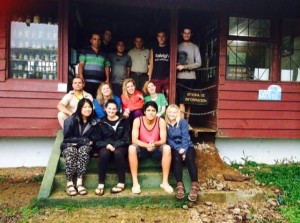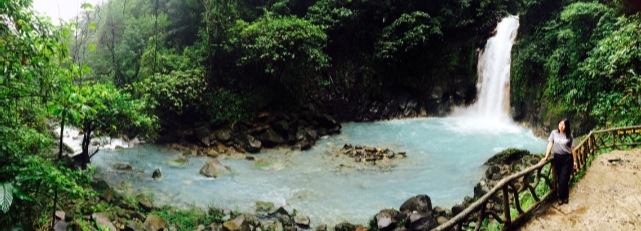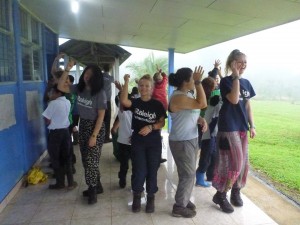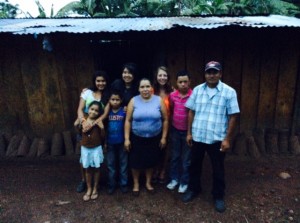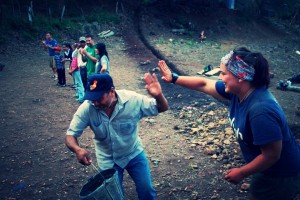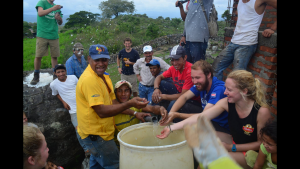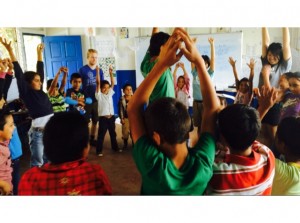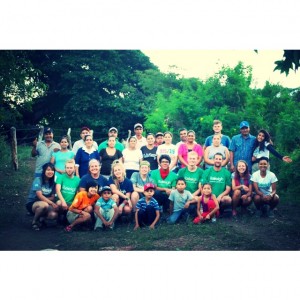
Raleigh 14G
This summer, I had the amazing opportunity to volunteer in Costa Rica and Nicaragua for Raleigh international, a sustainable development charity. During my seven weeks, I was placed on 2 different projects, both of which have taught me skills for life. Under the Day Leader system, I was able to work on my leadership skills. I was briefed on the aims and objectives of the day by project managers and was given responsibility for the delegation of tasks and group decisions for the day in a challenging and unfamiliar environment. My first attempt was not perfect, but taking on the feedback from my group, I was able to improve my leadership when I was leader for the second time, where I was much better at motivating, organising and leading my group during that day’s activities. I was placed in groups of 10 for both projects, working in a diverse group with people who all had different motivations, work ethics, attitudes, cultures and life experiences. This was a challenge, we knew that if we wanted to achieve the goals of the project, we had to work as a group: to listen to each other, understand each other’s strengths and weaknesses, overcome conflict and motivate one another. These people, strangers on day 1, become friends you remember for life, a mere 19 days later.
I spent 19 days in the jungle, working on a natural resources management project in Tenorio National Park, Costa Rica. With my new group X-ray 3 we learnt our first lesson in team-work when setting up our jungle camp. Sleeping under the trees in basha beds and hammocks, enjoying a unique experience we could only find on Raleigh.
With 1,000 visitors a day during the peak season, the eco-tourism brings massive social and economic benefits to the community. However, this is a heavy burden for the parks infrastructure and already stretched resources, and its rangers struggle to obtain the resources necessary for park maintenance. That’s where we come in. Ecotourism is a balancing act between protecting the environment and strengthening the local economy. At Tenorio, the increase in ecotourism has provided a large boost for the local community and economy. William, one of the rangers said it has increased cash flow through the villages and small hotels and restaurants thrive because of their prime location.
After a hard first day in the park, we were all so grateful for the opportunity to work amongst such natural beauty. We were hauling sacks of dirt from one side of the park to the other and out of nowhere this magical blue river appeared, Rio Celeste. It was a good morale booster to see what the trails would lead to.
To ensure that our work would be sustainable, we reached out to the community. We were involved with the local schools to encourage the next generation to care about the environment. We held 2 action days, raising awareness about issues such as the value of the national park, recycling and waste management. Our research also showed that poaching was an issue in this area, and therefore we themed an action day around the conservation of biodiversity. 4% of the world’s biodiversity is found in Costa Rica, for such a small country, this is a massive percentage, and our presentation stressed the value of the national park and their wildlife, and how poaching and deforestation threaten the very survival of some species, protecting the environment will allow the community to continue to benefit from the beauty of the national park in the future.
After saying goodbye to Tenorio and my family X-Ray 3, I knew it was time for a new adventure, a new challenge, a new family. After eager waiting, I finally found out that I was going to be placed on a Water, Sanitation and Hygiene Hygiene (WASH) project for the next 19 days. These WASH projects are vital for the communities of Nicaragua, a country where only 27% of people have a water service which goes directly to their homes. The small rural community of Cerco de Piedra have been waiting 10 years for this project and have invested their time, labour and money. The generous people of Cerco de Piedra even offered up their homes to us volunteers, allowing us to see first-hand their way of life, and the daily struggles of living without running water in their homes.
I lived with a family of 5 as well as another British volunteer Lauren, and a Costa Rican volunteer Dilany. These girls would be my sisters for the next 19 days. Our mother Sara greeted us as we arrived with our heavy rucksacks, full of excitement. Our house was located opposite a baseball pitch where we volunteers were destroyed by the locals every match! We were shown to our rooms which our host families had kindly given up for us, and our mum quickly bought out our lunch consisting of eggs, gallo pinto, noodles and tortillas hot from the cement stove as well as an amazingly sweet cup of Nicaraguan coffee, one sip and we all knew we would be addicted. Our house was small but very cosy, made up of wood with gaps in between each slab of wood, allowing light to enter our rooms. There was a metal roof, and on the rare occasions it rained, the sound of the rain hitting the roofs would make conversations inaudible in the house.
Our house was the only house in the small village (consisting of only 10 homes) that had young children, never a dull moment at home. The children were initially quite reserved but quickly became more comfortable around us. My little brothers Joer (9) and Engel (13) were eager to teach us how to play their game of marbles, knocking marbles into holes they had made on the dirt floor of the house. My little sister Ixzayana (7) loved playing with our hair, giving us very unique hairstyles, which we would wear with pride to our group meetings. The language difference was a major barrier, but fortunately for us we had Dilany living in our house, allowing us to have conversations with our families at night, it was extremely interesting finding out about their lives and sharing stories of our lives back home with them as well. However, this seemed like the perfect opportunity to learn some Spanish, and the children had kindly planned a small Spanish lesson for us. By the end of our stay, we had managed to name all the furniture in the house in Spanish, and the kids in English.
The work involved digging trenches and putting in pipes, it was a lot more physically challenging than I expected. But it’s still impressive to see how much progress can be made in a day by working alongside the community members. Their experience and skill with the tools helped us to improve our own methods. My brother Engel worked alongside the Raleigh volunteer’s everyday with our dad, Noé and many other locals. Joer and Ixzayana would help out after they came back from school as well. I was very taken aback at the strength and impressive pick axing skills the children shown when they first turned up to work, putting us volunteers to shame! You could see how desperately the locals wanted the water, always enthusiastic and putting in extra hours, giving us volunteers massive motivation when the days’ work was hard. As further encouragement the children would teasingly shout “cavar más rápido! (Dig faster!) It’s been hard for the community over the past few years. They have not only been living without easy access to clean water, but facing increased poverty from failing crops caused by drought. It reminds us and encourages us to continue to work to bring water on tap. There is no time for laziness here. We are all working together for a common aim.
Pick axing and shovelling, though a major part of our day, was not all we did. The other part of the project involves working with the members of CAPS (a Comité de Agua Potable y Saneamiento) committee. This group comprises community members who take responsibility to manage and provide access to potable water and sanitation in the area where they live. CAPS members ensure that the water system is kept in good condition, contributing to the welfare of the community and its social and economic development. At the training sessions, we volunteers would suggest scenarios that the community might find themselves in, such as contaminated water, people being unable to pay or new members arriving in the community. Together the committee analyses a variety of potential situations and seeks to find solutions. We Raleigh volunteers were also enthusiastic about action days to raise awareness of the issues surrounding hygiene and sanitation within the whole community, and constructing Tippy Taps to make it easier for people to wash their hands. This will ensure that the project is sustainable long after Raleigh has left, and can continue to provide the community with clean, safe water for the future. Not only will the new water system have immediate benefits to their homes, the improved access will contribute towards an improved quality of life in Cerco de Piedra for generations to come. Future generations would live life not knowing what life was like before having access to running water, a life before Raleigh. I feel privileged to have been a part of the community’s history and will remember my home and the kindness of my family in Nicaragua forever.
I loved the time I spent in Cerco de Piedra. My family had offered us everything they had and still wanted to give more. We were welcomed with open arms to their homes and lives and treated like their daughters. They have taught me so much, from making tortillas, to appreciating the small simple things in life. Living without electricity, taking cold showers daily and using vulgar smelling latrines have not made my time in Cerco de Piedra any less enjoyable. The community have taught us to feel true happiness – watching the starry sky, learning baseball, laughing with strangers who are now part of us. I knew that the work Raleigh was doing would change their lives for generations to come, but I never imagined how much these wonderful people could have impacted my life.
This Raleigh expedition has made me become more aware of my own values, perceptions and respect the diversity of others; I recognise that we live in an interdependent world; and this first-hand experience has helped me develop an understanding and passion for social justice, sustainable development and our environment. Expedition life has been tough and rewarding. The challenges faced on a personal, team and project level has been vital to help develop a certain mental resilience as well as a positive and proactive approach when faced with hardship. I have learnt how to cope under pressure, solve problems, live without home comforts, adapt to different cultures and learn where my strengths and weaknesses lie. I have met new people and made new friends, and hopefully done all I possibility can to contribute to my projects success.
This amazing opportunity would not have been possible without a grant from the Young Explorers’ Trust award. I cannot begin to express my gratitude. Your donation has helped me achieve my aim of travelling to Costa Rica and Nicaragua, not as a tourist but in an active position where I can help make tangible improvements to the lives of the local people and the environment. As well as allowing the continuation of Raleigh’s inspiring work which brings people together from all over the world, promoting the construction of sustainable communities and work to conserve the environment.


